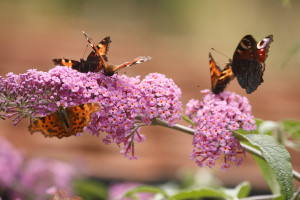Sir David Attenborough to support West Midlands in call to help butterfly population.
(c) Will Langdon
TV naturalist Sir David Attenborough is calling on people in the West Midlands to help reverse butterfly declines by planting nectar sources for pollinating insects in their gardens.
This Friday, the President of Butterfly Conservation is launching the wildlife charity’s citizen science project and the world’s largest butterfly survey – the Big Butterfly Count – and to celebrate the first weekend, a Butterfly Bonanza is being held in Worcestershire.
Experts from Butterfly Conservation’s West Midlands Branch will be at Phepson Farm in Droitwich on Saturday 18th and Sunday 19th July, offering advice on what to plant in your garden to help pollinators. Children will also be invited to sow wild flower seeds in the fields around the farm and go on a wildlife safari.
Overnight camping is available too and on both days visitors will be invited to attend guided walks at Butterfly Conservation’s two nearby reserves – Trench Wood and Grafton Wood – which are managed jointly with Worcestershire Wildlife Trust.
Further details on the event can be found at www.butterfly-conservation.org/butterflyweekend
Mike Williams is Publicity Officer for Butterfly Conservation’s West Midlands Branch. He said: “Our Butterfly Bonanza weekend will prove a great opportunity to do a Count and see some of Worcestershire’s very special butterflies, like the Silver-washed Fritillary and White Admiral.
“Experts will also be on hand to offer advice on what plants people can grow in their garden to encourage butterflies. Taking part in the Count is very easy and we hope by visiting our reserves everyone will be inspired to take part”.
A number of free butterfly events are being held across Worcestershire, Staffordshire and Shropshire throughout the duration of the Big Butterfly Count, which runs from 17th July-9th August. See www.butterfly-conservation.org/WestMidsEvents for details.
For nature lovers who can’t attend an event, Sir David Attenborough is calling on them to plant pots in their gardens or window ledges, using nectar sources such as Catmint, Lavender, Oregano, Echinacea and Cranesbill.
Sir David said: “The UK’s butterflies really need your help this summer. Three-quarters are in decline and one-third in danger of extinction. The ongoing and alarming loss of their habitat is a major and worrying factor in their falling numbers. But by taking one simple step you can help to reverse this loss. Plant a few pots in your garden or on your window ledge with the right plants and you can provide butterflies, moths and other pollinating insects with a lifeline of food and shelter.
“It’s up to every single one of us to make sure that the spectacle of mid –summer butterflies remains a much anticipated highlight of the season rather than becoming a long-mourned memory. Make yours a butterfly summer by getting out for the Count.”
You can also do as many Counts as you like in your own garden between 17th July and 9th August; just find a sunny place and spend 15 minutes counting every butterfly seen and then submit sightings online at www.bigbutterflycount.org.
Around 45,000 people took part in last year’s Big Butterfly Count, spotting almost 560,000 butterflies. Last year the Small Tortoiseshell continued its fight back after years of decline. The butterfly, whose population has plummeted by 78% since the 1970s, saw numbers rise by almost a quarter compared to the summer of 2013 making it the fourth most commonly seen Big Butterfly Count species – its highest ever ranking.
Last summer was also good for Peacock, which was the most abundant Count butterfly. More information on the West Midlands Branch of Butterfly Conservation can be found at
www.westmidlands-butterflies.org.uk



